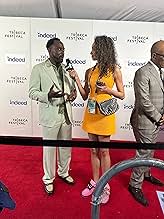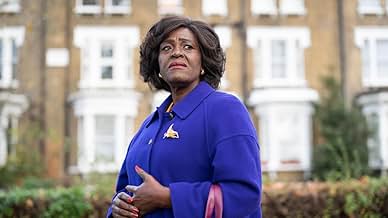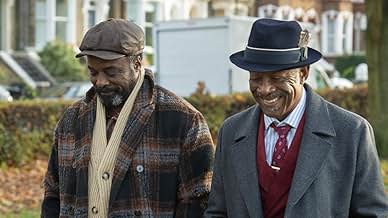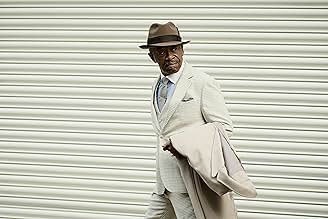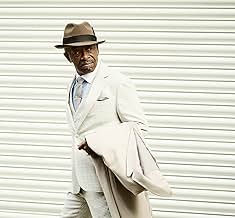Ein bewegendes und lustiges Drama über einen überschwänglichen, verschlossenen Familienvater, der seine Ehe beenden und mit seinem besten Freund zusammenleben will, mit dem er seit fast 60 J... Alles lesenEin bewegendes und lustiges Drama über einen überschwänglichen, verschlossenen Familienvater, der seine Ehe beenden und mit seinem besten Freund zusammenleben will, mit dem er seit fast 60 Jahren eine Affäre hat.Ein bewegendes und lustiges Drama über einen überschwänglichen, verschlossenen Familienvater, der seine Ehe beenden und mit seinem besten Freund zusammenleben will, mit dem er seit fast 60 Jahren eine Affäre hat.
- 2 BAFTA Awards gewonnen
- 3 Gewinne & 2 Nominierungen insgesamt
Folgen durchsuchen
Empfohlene Bewertungen
My Review- Mr Loverman
Streaming on Foxtel
My Rating 9/10
Each episode of this unusual and thought provoking 8 part series begins with a famous literary quote.
The first episode quotes James Baldwin "Not everything that is faced can be changed, but nothing can be changed until it is faced." The final episode opens with "People pay more for what they do, and still more for what they have allowed themselves to become. And they pay for it very simply; by the lives they lead.".
The journey from the first to the final episode is emotional, funny and l think authentic in the way it portrays the consequences of choices that we all make in life .
The Mr Loverman or central character Barrington or Barry Walker referred to in the title is so skillfully played by Lennie James who deservedly won this years BAFTA award for Best TV actor.
Barry is a dapper narcissistic 74 year old British Caribbean man going through a turning point crisis in his 50 year marriage to Carmel also played superbly by Sharon D. Clarke.
Sharon and Barry obviously are miserable together after raising their 2 daughters Maxine and Donna basically living separate lives always emotionally at odds with each other.
Carmel accuses Barry when he returns home drunk of sleeping around with prostitutes however in reality her husband has had a male lover known to the family for years as Uncle Morris.
Ariyon Bakare who plays Barry'S lover Morris Del La Roux also deserved his BAFTA as supporting actor.
Only the Brits could portray this story of a middle class black family and their community that instead of focusing on race relations focuses on the secrets and deception of a modern marriage that any family of any colour could go through.
Decades after homosexuality was legalised in Britain Morris and his closeted lover Barry are also at a crossroads in their relationship that begun in their youth in Antigua, a Caribbean island.
Morris is now out of the closet but Barry's internalised homophobia and his alcohol abuse keeps him in denial about his true sexuality.
Every character in this series I found interesting especially the women in Barry's life including his daughters Maxine and Donna played by Tamara Lawrance and Sharlene Whyte .
Both daughters are very different in their tolerance and affection for their father. Maxine is the younger more worldly daughter while Donna is a chip off her mother's block a stubborn perfectionist.
Special mention of Tahj Miles who plays Daniel Barry's grandson and Donna Walkers only son .
Daniel is a young man preparing to go to university and is grappling with his own anxieties alongside his exciting future.
It's an unusual experience these days for me to be so impressed with a series and congratulations to Cambodian Director Hong Khaou and screenwriter Nathaniel Price who has adapted Bernardine Evaristo'z novel and produced such a contemporary and thoughtful series.
Each episode of this unusual and thought provoking 8 part series begins with a famous literary quote.
The first episode quotes James Baldwin "Not everything that is faced can be changed, but nothing can be changed until it is faced." The final episode opens with "People pay more for what they do, and still more for what they have allowed themselves to become. And they pay for it very simply; by the lives they lead.".
The journey from the first to the final episode is emotional, funny and l think authentic in the way it portrays the consequences of choices that we all make in life .
The Mr Loverman or central character Barrington or Barry Walker referred to in the title is so skillfully played by Lennie James who deservedly won this years BAFTA award for Best TV actor.
Barry is a dapper narcissistic 74 year old British Caribbean man going through a turning point crisis in his 50 year marriage to Carmel also played superbly by Sharon D. Clarke.
Sharon and Barry obviously are miserable together after raising their 2 daughters Maxine and Donna basically living separate lives always emotionally at odds with each other.
Carmel accuses Barry when he returns home drunk of sleeping around with prostitutes however in reality her husband has had a male lover known to the family for years as Uncle Morris.
Ariyon Bakare who plays Barry'S lover Morris Del La Roux also deserved his BAFTA as supporting actor.
Only the Brits could portray this story of a middle class black family and their community that instead of focusing on race relations focuses on the secrets and deception of a modern marriage that any family of any colour could go through.
Decades after homosexuality was legalised in Britain Morris and his closeted lover Barry are also at a crossroads in their relationship that begun in their youth in Antigua, a Caribbean island.
Morris is now out of the closet but Barry's internalised homophobia and his alcohol abuse keeps him in denial about his true sexuality.
Every character in this series I found interesting especially the women in Barry's life including his daughters Maxine and Donna played by Tamara Lawrance and Sharlene Whyte .
Both daughters are very different in their tolerance and affection for their father. Maxine is the younger more worldly daughter while Donna is a chip off her mother's block a stubborn perfectionist.
Special mention of Tahj Miles who plays Daniel Barry's grandson and Donna Walkers only son .
Daniel is a young man preparing to go to university and is grappling with his own anxieties alongside his exciting future.
It's an unusual experience these days for me to be so impressed with a series and congratulations to Cambodian Director Hong Khaou and screenwriter Nathaniel Price who has adapted Bernardine Evaristo'z novel and produced such a contemporary and thoughtful series.
Not read the book but recognise an impressive piece of literary fiction portrayed beautifully by some great acting.
The homosexual sex scenes are maybe at times too heavy. The weaving in and out of the past can also occasionally be difficult to follow but is mainly very pertinent and intensely moving adding nicely into the running story line. The subject of homosexuality is still today although better than yesterday often difficult for many people to come to terms with and hopefully viewing this engaging film will bring more understanding into the public arena. The drama of youth going along tracks not necessarily, in line with parental aspirations is also nicely woven into the story. I found it moving and believable.
The homosexual sex scenes are maybe at times too heavy. The weaving in and out of the past can also occasionally be difficult to follow but is mainly very pertinent and intensely moving adding nicely into the running story line. The subject of homosexuality is still today although better than yesterday often difficult for many people to come to terms with and hopefully viewing this engaging film will bring more understanding into the public arena. The drama of youth going along tracks not necessarily, in line with parental aspirations is also nicely woven into the story. I found it moving and believable.
Lennie James is a much underrated actor who has taken on some gritty roles in his career. Was far more impressed with his performance in another BBC miniseries; The State Within, back in 2006.
However, no matter how you dress this up with rationalised pseudo reasoning, it comes down to portraying someone who never had the guts to live as themselves, but chose to destroy another person's life and happiness along with their family. So much for marriage vows to his wife..!
All rather strange, when you consider how hard SSM was fought for, and yet here, a nearly lifelong marriage is discarded as almost a complete irrelevance to the story!
The first episode has a tagline.. "Is Barry brave enough to leave his wife?" Why is the final act of being unfaithful to your wife for decades described as being .."brave" ?
This isn't an uncommon theme, the question is...why are dramas like this attempting to make a virtue out of the appalling philandering behaviour of a husband.
However, no matter how you dress this up with rationalised pseudo reasoning, it comes down to portraying someone who never had the guts to live as themselves, but chose to destroy another person's life and happiness along with their family. So much for marriage vows to his wife..!
All rather strange, when you consider how hard SSM was fought for, and yet here, a nearly lifelong marriage is discarded as almost a complete irrelevance to the story!
The first episode has a tagline.. "Is Barry brave enough to leave his wife?" Why is the final act of being unfaithful to your wife for decades described as being .."brave" ?
This isn't an uncommon theme, the question is...why are dramas like this attempting to make a virtue out of the appalling philandering behaviour of a husband.
Wow. Just wow. I accidentally stumbled upon this magnificent gem and how delighted I am. Beautifully shot with excellent performances by all, I was truly surprised how much story was tightly packed into each 30 minute episodes (I didn't score a 10 simply because of my selfish desire to see these characters for 60 minutes).
The story authentically captures the essence of West Indian life (the music, the accent and nuances of speech, slang words, the cultural sensitivities, food, and the deep influence of religion) as well as the immigrant experience (prohibition on speaking patois by youngsters, youngsters struggling to straddle both worlds - that of their family and that of their adopted home). The emotions are raw and runs deep.
When people are prohibited from living as their true authentic selves due to fear of ostracism or death, they are more inclined to enter into relationships for cover which creates more hurt and deceit. This series is a gift of remembrance to the many unknown men and women who suffered in silence and forced to live inauthentic lives.
The story authentically captures the essence of West Indian life (the music, the accent and nuances of speech, slang words, the cultural sensitivities, food, and the deep influence of religion) as well as the immigrant experience (prohibition on speaking patois by youngsters, youngsters struggling to straddle both worlds - that of their family and that of their adopted home). The emotions are raw and runs deep.
When people are prohibited from living as their true authentic selves due to fear of ostracism or death, they are more inclined to enter into relationships for cover which creates more hurt and deceit. This series is a gift of remembrance to the many unknown men and women who suffered in silence and forced to live inauthentic lives.
Mr. Loverman is a heartfelt, character-driven drama that masterfully explores love, identity, and the deep regrets of living a life in secrecy. Lennie James delivers a standout performance as Barry Walker, a 74-year-old gay Black man torn between his long-time marriage and his true love, Morris, played by Ariyon Bakare. Sharon D. Clarke shines as Barry's wife, Carmel, bringing depth to a woman who has silently endured years of betrayal. The series is a rare portrayal of elderly Black gay love, delving into the emotional and societal costs of inauthenticity.
Set against the vibrant backdrop of Hackney, London, the show immerses us in the complexity of Barry's life, touching on themes of homophobia, misogyny, and intergenerational conflict. The flashbacks, showing Barry's and Morris's painful past in both Antigua and the UK, underscore the heavy trauma they carry. While updated to reflect modern-day issues like gentrification and same-sex marriage, the series stays true to its roots in examining the difficulties of coming out, especially within the Black community.
Despite some clunky dialogue and underdeveloped supporting characters, Mr. Loverman excels in capturing the emotional tension between Barry, Morris, and Carmel. The chemistry between James and Bakare is palpable, making their hidden relationship all the more poignant. Meanwhile, the strained dynamic between Barry and Carmel is both heartbreaking and raw, showcasing the bitter toll of deception.
The show bravely addresses the struggles of being an old, gay Black man, particularly through scenes where Barry grapples with violent memories and societal rejection. It highlights not only the personal cost of living inauthentically but also the enduring resilience of love.
Series is a necessary, timely exploration of Black queer love, and its sincere, thought-provoking approach will resonate with viewers seeking a more nuanced story of love, self-acceptance, and the courage to live truthfully.
Set against the vibrant backdrop of Hackney, London, the show immerses us in the complexity of Barry's life, touching on themes of homophobia, misogyny, and intergenerational conflict. The flashbacks, showing Barry's and Morris's painful past in both Antigua and the UK, underscore the heavy trauma they carry. While updated to reflect modern-day issues like gentrification and same-sex marriage, the series stays true to its roots in examining the difficulties of coming out, especially within the Black community.
Despite some clunky dialogue and underdeveloped supporting characters, Mr. Loverman excels in capturing the emotional tension between Barry, Morris, and Carmel. The chemistry between James and Bakare is palpable, making their hidden relationship all the more poignant. Meanwhile, the strained dynamic between Barry and Carmel is both heartbreaking and raw, showcasing the bitter toll of deception.
The show bravely addresses the struggles of being an old, gay Black man, particularly through scenes where Barry grapples with violent memories and societal rejection. It highlights not only the personal cost of living inauthentically but also the enduring resilience of love.
Series is a necessary, timely exploration of Black queer love, and its sincere, thought-provoking approach will resonate with viewers seeking a more nuanced story of love, self-acceptance, and the courage to live truthfully.
Top-Auswahl
Melde dich zum Bewerten an und greife auf die Watchlist für personalisierte Empfehlungen zu.
- How many seasons does Mr Loverman have?Powered by Alexa
Details
- Farbe
Zu dieser Seite beitragen
Bearbeitung vorschlagen oder fehlenden Inhalt hinzufügen





